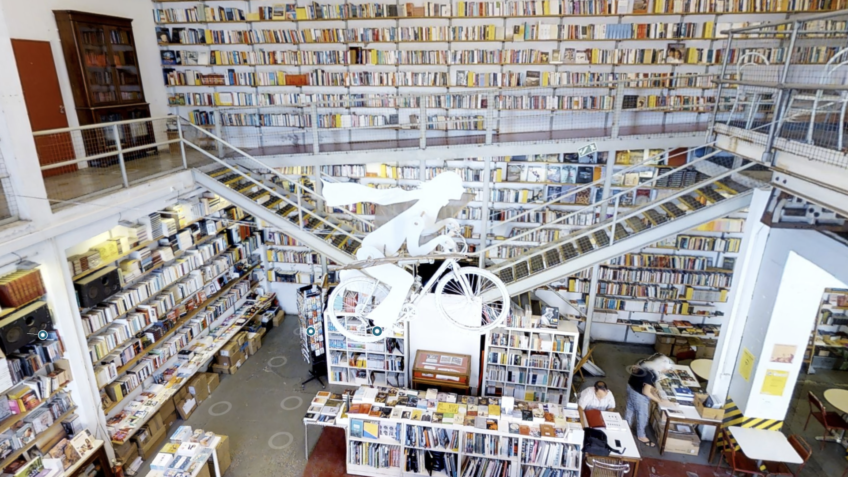
May heaven be a kind of bookstore in which he can go on planting books forever and ever, writes Kakay
“In a desert without water
On a moonless night
In a nameless country
Or on a bare land
By bigger what it is o despair
None absence It is more funda do what a old.”
–Poem “Ausência”, by Sophia de Mello Breyner Andresen
It was walking in the bookshop, taking my time, leafing through books and looking at the scattered gadgets that I found myself distracted, fixing my gaze on a smile that seemed to have a life of its own. I smiled back and the conversation flowed, as it does in bookstores. I told him that a friend had introduced me to that place and that I had been enchanted by the white bicycle, one of the poetic machines created by the artist Pietro Proserpio, hanging from the ceiling and that seemed to fly.
I had just “met” Sophia de Mello Breyner and was reading the poem “Ausência”, which came to mind when I heard that he had left. From conversation to conversation, we felt an affinity that made me think he was from Minas Gerais and not Portuguese.
On the 3rd or 4th meeting, after saying that he had loved the name “Ler Devagar”, he said, a little overwhelmed, that he was the owner of the bookstore. The bookshop, today, is located where the historic Gráfica Mirandela used to be, now the LX Factory, and has several works of art and a small bar. In addition to a super charming cultural space called Talante, by our artist Antônio Grassi. And he soon invited me to open a bookstore with him in Belo Horizonte, in a building belonging to a well-known cinema that was closing. I was enchanted by the idea and even traveled in that dream, which many of us have, of having a bookstore. I called a guru and he told me that if I wanted to lose money it was a safe way to invest. I remembered the brilliant Mia Couto, “No words reach the world, I know. Still, I write”.
From then on, I felt close to my favorite bookseller, without being so intimate, and whenever I went to Lisbon, I took care to look for him. A prose that enchanted and was framed by the powerful smile. Gradually, I learned about his life as a cultural agitator, his solid humanist training, his left-wing militancy, his thousands of friends and, above all, his love for books.
It was this passion that made him open several bookstores in the small town of Óbidos, which was baptized by Unesco, in 2015, as “Creative City of Literature”. Of all of them, the one that most impacted me was the one located inside an old desecrated Church. He is said to have founded over 1,000 bookstores in his lifetime. What justifies an existence. Last year, at the Literary Festival in Óbidos, I had the joy of participating in a panel on poetry and literature within that Church. And then I walked, stopped and read in bookshops, markets, hotels and bars. And Zé Pinho seemed to float with his smile and a little bag from the festival slung over his shoulder. Happy.
A restless creator, he founded the festivals “Fólio – Festival Internacional” and “Latitudes – Festival de Literatura e Viajantes” in Óbidos and elevated the city (county, in Portugal) to a Literary Town. He told, with hidden pride, that he had rehabilitated the historic Ferin bookstore, on Rua Nova do Almada, in Lisbon. He was the editor of more than 20 books and, in recent years, his conversation turned to the creation of a Centro Cultural e Social do Bairro Alto, a multidisciplinary project with film studios, concert halls, performing arts, galleries, audiobook recording and podcast and, of course, bookstores.
When I saw him leave –and, fortunately, he had all the honors, including the honors of the Portuguese Government in his lifetime–, not knowing what awaits us on the other side, I took the help of master Jorge Luis Borges: “I always imagined that heaven was a kind of bookstore”. Zé deserves it to be so and that he can continue planting books forever and ever.
Who best defined his departure was his brother in life and literature Afonso Borges, the brilliant creator of “Sempre um Papo”:
“Lyrics and books don’t just lose a festival manager and bookshop owner. They lose a creator, an artist, a visionary who saw in literature the possible utopia of civilization. José Pinho’s legacy is this: books everywhere.”
Source: https://www.poder360.com.br/opiniao/ze-pinho-leia-devagar/

